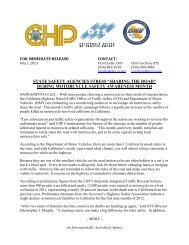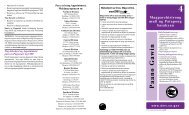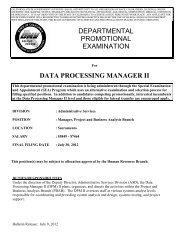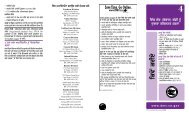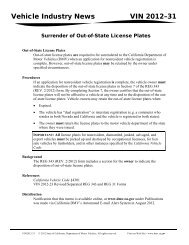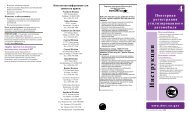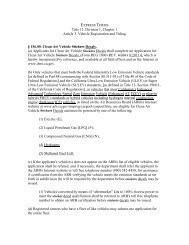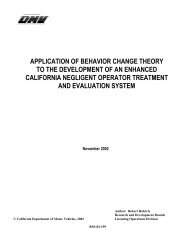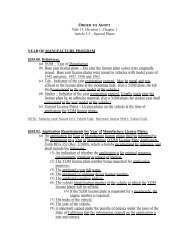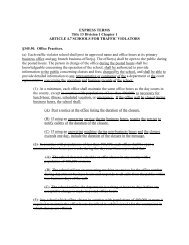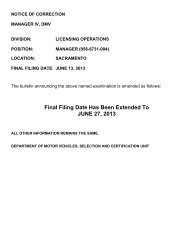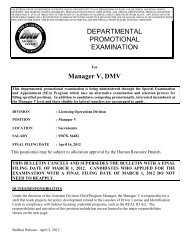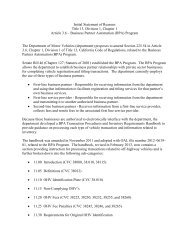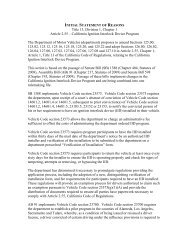Commercial Driver Handbook ( PDF ) - California Department of ...
Commercial Driver Handbook ( PDF ) - California Department of ...
Commercial Driver Handbook ( PDF ) - California Department of ...
You also want an ePaper? Increase the reach of your titles
YUMPU automatically turns print PDFs into web optimized ePapers that Google loves.
the-counter drugs (cold or allergy medicines) which<br />
may make the driver drowsy or otherwise affect<br />
safe driving ability. However, possession and use<br />
<strong>of</strong> any medication given to a driver by a physician<br />
is permitted if the physician advises the driver that<br />
the medicine will not affect safe driving ability.<br />
Pay attention to warning labels <strong>of</strong> legitimate drugs<br />
and medicines and to your physician’s orders<br />
regarding possible side effects. Stay away from<br />
illegal drugs. Do not use any substance that hides<br />
fatigue–the only cure for fatigue is rest. Alcohol<br />
can make the effects <strong>of</strong> the drugs much worse.<br />
The safest rule is do not mix drugs with driving.<br />
Use <strong>of</strong> drugs can lead to traffic collisions resulting<br />
in death, injury, and property damage. Furthermore,<br />
it can lead to arrest, fines, and jail sentences. It may<br />
also mean the end <strong>of</strong> a person’s driving career.<br />
Be ready to drive<br />
get enough sleep. Sleep is not like money. You<br />
can’t save it up ahead <strong>of</strong> time and you can’t borrow<br />
it. But, just as with money, you can go into debt<br />
with it. If you don’t sleep enough, you “owe”<br />
more sleep to yourself. This sleep debt can only<br />
be paid <strong>of</strong>f by sleeping. You can’t overcome it<br />
with willpower, and it won’t go away by itself.<br />
The average person needs seven or eight hours <strong>of</strong><br />
sleep every 24 hours. Leaving on a long trip when<br />
you’re already tired is dangerous. If you have a<br />
long trip scheduled, make sure that you get enough<br />
sleep before you go.<br />
Exercise regularly. Resistance to fatigue and<br />
improved sleep are among the benefits <strong>of</strong> regular<br />
exercise. Try to incorporate exercise into your<br />
daily life. Instead <strong>of</strong> sitting and watching TV in<br />
your sleeper, walk or jog a few laps around the<br />
parking lot. A little bit <strong>of</strong> daily exercise will give<br />
you energy throughout the day.<br />
Eat healthy. It is <strong>of</strong>ten hard for drivers to find<br />
healthy food. But with a little extra effort, you<br />
can eat healthy, even on the road. Try to find<br />
restaurants with healthy, balanced meals. If you<br />
must eat at fast-food restaurants, pick low-fat items.<br />
Another simple way to reduce your caloric intake<br />
is to eliminate fattening snacks. Instead, try fruit<br />
or vegetables.<br />
- 60 -<br />
Avoid medication. Many medicines can make<br />
you sleepy. Those that do, have a label warning<br />
against operating vehicles or machinery. The most<br />
common medicine <strong>of</strong> this type is an ordinary cold<br />
pill. If you have to drive with a cold, you are better<br />
<strong>of</strong>f suffering from the cold than from the effects<br />
<strong>of</strong> the medicine.<br />
Visit your doctor. Regular checkups can literally be<br />
lifesavers. Illnesses such as diabetes, heart disease,<br />
and skin and colon cancer can be detected easily<br />
and treated if found in time. You should consult<br />
your physician or a local sleep disorder center if<br />
you suffer from frequent daytime sleepiness, have<br />
difficulty sleeping at night, take frequent naps,<br />
fall asleep at strange times, snore loudly, gasp<br />
and choke in your sleep, and/or wake up feeling<br />
as though you have not had enough sleep.<br />
While you are driving<br />
Keep cool. A hot, poorly ventilated vehicle can<br />
make you sleepy. Keep the window or vent cracked<br />
open or use the air conditioner, if you have one.<br />
Take breaks. Short breaks can keep you alert.<br />
But the time to take them is before you feel<br />
really drowsy or tired. Stop <strong>of</strong>ten. Walk around<br />
and inspect your vehicle. It may help to do some<br />
physical exercises. Be sure to take a mid-afternoon<br />
break and plan to sleep between midnight and 6 a.m.<br />
Recognize the danger signals <strong>of</strong> drowsy driving.<br />
Sleep is not voluntary. If you’re drowsy, you can fall<br />
asleep and never even know it. If you are drowsy,<br />
you are likely to have “micro sleeps”–brief naps<br />
that last around four or five seconds. At 55 miles<br />
an hour, that’s more than 100 yards, and plenty <strong>of</strong><br />
time for a crash. Even if you are not aware <strong>of</strong> being<br />
drowsy, if you have a sleep debt you are still at<br />
risk. There are a few ways to tell if you’re about to<br />
fall asleep. If you experience any <strong>of</strong> these danger<br />
signs, take them as a warning that you could fall<br />
asleep without meaning to:<br />
• Your eyes close or go out <strong>of</strong> focus by themselves.<br />
• You have trouble keeping your head up.<br />
• You can’t stop yawning.<br />
• You have wandering, disconnected thoughts.<br />
• You don’t remember driving the last few miles.



